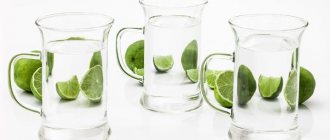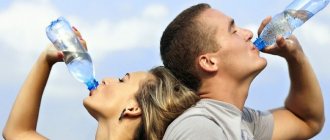How water affects health. Why should you drink water?
Each of us at least once in our lives has heard such expressions as “Water is the basis of life” and “Water is the source of life on Earth.” And this is to some extent true: water is the most common liquid on the planet, including in the human body. A person consists of 70-75% water, it is found in the blood, in muscles, and is a structural component of all cell membranes. In terms of importance for humans, water is in second place after air; there is evidence that a person can go without water for up to 7 days.
Water performs a wide variety of functions in the human body.
:
- water is a universal solvent and carrier of microelements. It is largely through water that we ensure the maintenance of an adequate mineral composition of our internal environments;
- water has a structural function;
- The thermoregulatory function is manifested in the fact that water has a high heat capacity;
- water ensures cell metabolism;
- maintaining mucous membranes, such as joints with their articular surface, intra-articular fluid, mucous membranes of the mouth, gastrointestinal tract, mucous membranes of the genitourinary tract - water maintains moisture everywhere;
- enzymatic, without its participation the enzymatic transformation of substances would be impossible;
- maintaining the correct rheology of fluids such as blood, bile and lymph;
- water plays a big role in the detoxification process;
- water is a source of microelements such as calcium, magnesium, chlorine, iron and others.
The modern rhythm of life, excessive concentration on work, the desire to do everything and everywhere often lead to the fact that we forget to eat properly and regularly, not to mention drink enough water. But if we forget to eat, this does not affect the body as badly as not getting enough water. As a result of dehydration, you may notice the following changes in the body:
:
- the skin becomes dry and thin, as a result of which wrinkles appear much faster;
- hair and nails also undergo changes - they become thinner and lose their shine;
- dryness appears in the mouth, a coating on the tongue and bad breath may appear;
- eye fatigue, discomfort in the eyes occurs, as the cornea lacks moisture;
- the blood becomes thicker, which can lead to thrombosis;
- constant water deficiency leads to kidney problems;
- resistance to infections decreases;
- Appetite increases, since in the brain the centers of hunger and thirst are very close to each other, and often a person confuses the desire to drink with the desire to eat - hence overeating.
Monthly regional norms
A unified methodology for calculating payments for cold and hot water supply has been approved by law. Water tariffs in regions vary and take into account the following factors:
- climate features;
- degree of wear and tear of fixed assets;
- population density;
- the cost of other energy resources - electricity, solid fuel, etc., used to supply water;
- the cost of living, which affects the level of wages of employees of utility companies and other less significant circumstances.
On average in the Russian Federation, monthly standards are set as follows:
- cold water - from 4 to 7 cubic meters at a price of 25 to 38 rubles per 1 cubic meter;
- hot water - from 2.5 to 4.7 cubic meters costing from 80 to 190 rubles per 1 cubic meter.
The highest standards for the cost of one cubic meter of water are observed in Moscow and the region, the lowest in Ufa. Regional standards are approved by resolutions of local authorities.
How to calculate your daily water intake
Interesting fact
: Talk about drinking plenty of water started right after the plastic bottle was invented. Whether this is a coincidence or not, no one knows for sure. The plastic bottle first appeared in 1970, and already in the mid-70s, talk about the need to drink large amounts of water simply did not stop. So how much water does a person really need per day?
So, there are several options for how to calculate your daily water consumption. The average water calculation is 30-40 milliliters per day per 1 kilogram of body weight per day. This suggests that if a person weighs 60 kg, he should drink 1800 ml of water, or 1.8 liters, per day.
There is also an option for calculating water consumption rates developed by the US National Research Council. The bottom line is that you need to consume 1 ml of water for every calorie of food. Therefore, if a person eats about 1500 kcal per day, then he needs to drink 1.5 liters of water. True, we get about 60% of the necessary moisture from food.
The human body loses about 2-2.5 liters of fluid per day: during urination, during breathing, through sweat, especially during intense physical activity. Therefore, it is extremely important to maintain balance. Our own body can tell us whether we have enough water or not: to do this we need to pay attention to the color of our urine. If it is dark, it means the person is not drinking enough and needs to increase fluid intake. Second test: pinch your hand on the outside of your palm. If the skin smoothes out quickly, everything is fine; if it smoothes out slowly, the cells need moisture.
However, despite all the formulas that exist today for calculating the required amount of water consumption per day, despite the established rule “consume at least 2 liters of water per day,” your water norm is a purely individual value. In a recent interview, WHO representative, coordinator of the organization's programs on water, hygiene and health, Bruce Gordon, denied the existence of water consumption standards: “WHO has no official recommendation on the amount of water that should be consumed.
We recommend
“Amino acids in food: daily requirement, signs of deficiency” Read more
The reason is that there are many factors that influence what this water consumption rate is for you. For example, imagine that you work all day under the scorching sun, or play sports. And you can consume from one or two liters to a very large amount of water. It also depends on the food you eat, your weight, metabolism, age. However, there are recommended volumes. Some organizations have stated that it is necessary to consume fluid in such and such a volume. And I’m talking about liquid, because we’re not necessarily talking about pure water. You can eat certain fruits that have a lot of water in them...”
Why were the standards introduced?
Water consumption standards were introduced by the government of the country in order to motivate people to install meters. After all, they are significantly overestimated and most residents use much less water. For example, according to the standard, one tenant consumes 6.935 cubic meters or 200 liters of cold water per month per month. A standard bathtub holds 250 liters of water. Not all people take it daily. Even if you wash dishes and hands, wash things in a washing machine, take a shower, 200 liters are not consumed. The norm was determined taking into account the natural needs shown in the table below.
| What is water used for? | Unit | Volume consumed in liters |
| Washing in the shower | day | 30 |
| Shaving, washing, other daily needs | a week | 200 |
| Flushing water from the toilet cistern | day | 200 |
| Taking a bath | a week | 400 |
| Washing dishes, cooking, wet cleaning | a week | 500 |
But in fact, 4.5 cubic meters of water per month is enough for one person. According to the law, utility companies have the right to increase the approved standard up to two times in order to cover costs. In this case, you have to pay even more for hot and cold water.
It is beneficial for the municipality that citizens of the country install water meters. Because one number of people can be registered in an apartment or country house, but in fact many more people live. In such a case, actual water consumption increases by 3-4 times. The standards make it possible to fully cover this overexpenditure and avoid financial expenses for municipal authorities.
Should you count water in other foods and drinks?
Based on the above, it follows that it is not at all necessary to cover the norm of liquid consumption with water alone. Berries, vegetables and fruits contain structured water, which is much better absorbed by the cells of our body. Life without water is impossible!
A large number of studies have been conducted proving that just an increase in vegetables, fruits and berries in the diet helps improve facial structure and skin elasticity. Below are the leading products in terms of the content of structured water in their composition
:
- Iceberg lettuce
– 95.64% water - in fact, there is nothing but water in this leafy vegetable. Other types of lettuce - such as romaine - contain much more nutrients.
- Celery
– 95.43% water is an excellent choice for those trying to lose weight.
- Radish
– 95.27% water – a juicy radish salad will be a good addition to the main dish. It is rich in antioxidants, vitamins and minerals that improve digestion and help the body resist infections.
- Cucumber
– 95.23% water – perfectly saturates with moisture both inside and outside in the form of a cucumber mask. A nice bonus is a complex of useful nutrients, including vitamin K, potassium and magnesium.
- Zucchini
– 94.79% water – This vegetable is also rich in fiber.
- Tomato
– 94.52% water - saturates us with life-giving moisture, and in addition improves the functioning of the hematopoietic system, reduces the risk of stroke and heart attack and helps prevent the development of osteoporosis.
- Sweet (bell) pepper
– 93.89% water – bell peppers – regardless of the variety – contain a large amount of water. In addition, the vegetable is rich in fiber, potassium and vitamin C - nutrients that our immune system really needs.
- Eggplant
– 92.3% water - together with life-giving moisture, you can get a good portion of healthy fiber, the consumption of which reduces the risk of cardiovascular diseases.
- Cauliflower
– 92.07% water – cauliflower does not give the impression of being a particularly juicy vegetable, but, nevertheless, it is among the top 10 products in terms of water content.
- Watermelon
– 91.45% water - surprisingly, the juicy and watery watermelon occupies only tenth place in the ranking. There is no doubt that there is plenty of moisture in it - just imagine: one serving of berries is equivalent to 250 ml of water. In addition, watermelon contains the important antioxidant lycopene, which prevents the development of cancer, diabetes and heart disease.
- Spinach
– 91.4% water – spinach gives up most of its moisture during heat treatment – when stewed it becomes tender and juicy. The vegetable also contains calcium, magnesium and potassium - elements necessary for our bones.
- Strawberry
– 90.95% water – This red berry is rich in antioxidants. Scientists say that eating strawberries reduces the risk of Alzheimer's disease and hypertension.
- Cantaloupe melon
– 90.15% water – one serving of berries contains only 46 calories and a whole gram of healthy fiber. Not to mention an impressive dose of vitamin A.
- Grapefruit
– 90% water – the list is completed by the not most popular, but very juicy citrus – grapefruit. In terms of water content, it is far from tangerines and oranges. In addition, citrus is rich in vitamin C and phytonutrients that have anti-cancer properties.
We recommend
“Healthy foods for teenagers: recipes” Read more
Studies have also been carried out on various drinks and the hydration capacity of these drinks has been assessed. Thus, water (still and sparkling), Coca-Cola, Diet Coke, isotonic sports drink, oral rehydration solution, orange juice, light beer, hot black coffee, hot black tea, iced black tea, high-fat milk and low fat. It was not water that showed the best hydration ability: the Beverage Hydration Index (BIH) for oral rehydration solution (1.50), skim milk (1.44) and high-fat milk (1.32) was significantly higher than for water (1.50). 0).
The legislative framework
The main document regulating the provision of services in the water supply sector is Government Decree No. 354. The current set of rules contains formulas for calculating the standard for the use of hot water and cold water. The values apply to residential premises with and without installed water meters.
Federal Law No. 210-FZ regulates the use of fixed rates in the constituent entities of the Russian Federation. The price for 1m3 of water is determined by the municipal service based on the meaning of this law. The cost of paying for water without a meter is determined for each subject of the Russian Federation individually.
Consumption of water without a meter significantly increases the amount on your receipt. Especially considering that incentive measures will gradually tighten. This is due to the fact that the state strives to minimize the possibility of various manipulations with payment for the resource used. For example, if in fact there are only one number of people living, but there are much fewer registered ones.
Situations when it is necessary to adjust the water consumption rate
There are various situations and diseases in which you still have to strictly monitor the amount of fluid you drink and adjust the rate of water consumption; let’s look at them in more detail.
- In hot weather, we sweat more, which means we lose more moisture, which needs to be replenished.
- When visiting a bathhouse or sauna, active loss of fluid also occurs.
- During pregnancy and breastfeeding. During pregnancy, you should definitely drink water, but you need to monitor it. In late pregnancy, in the third trimester, there are disturbances in water balance. This is a very common pathology, edema in pregnant women, especially until the end of pregnancy. Here you need to be very careful and not give unnecessary stress.
- During illness, because any illness is accompanied by intoxication, it is advisable to increase the amount of fluid you drink, especially if high body temperature is added to this.
- For various chronic diseases, which include hypertension, heart, kidney and liver diseases, the rate of water consumption is adjusted and agreed with the attending physician. Usually, people with chronic diseases limit their water intake, but it is recommended to replenish it from vegetables and fruits, take a cool shower in the heat and drink tea acidified with lemon, and also avoid pickles and smoked foods.
- Often a person is faced with such an unpleasant and delicate problem as constipation due to insufficient fluid intake; in many cases, the situation can be solved by adjusting the drinking regime.
- Joint pain in some cases may also indicate insufficient water intake, because the joint consists of cartilage tissue, which in turn is 80% water. Due to this they are elastic and durable. The joint capsule also contains synovial fluid, which softens friction inside the joint. When dehydrated, discomfort appears in the joints, creaking in the elbows and knees. The cartilage becomes inelastic, and the joint fluid turns into a viscous and thick jelly. Depreciation decreases and friction inside joints increases.
- Food poisoning, diarrhea and vomiting are also critical situations that require increased water consumption, since in these conditions the body consumes a catastrophically large amount of fluid, so dehydration occurs many times more often. To replenish losses, you don’t always need to drink regular water. Doctors recommend adding salt to water in case of poisoning, vomiting or diarrhea and drinking it in small sips. Salt retains fluid in the body and reduces the likelihood of dehydration.
When to drink more
As we have already found out, the amount of water depends primarily on weight. And also on age, gender, physical activity, environmental temperature conditions.
- The need increases during sports and heavy physical labor. Due to sweating, losses increase. Therefore, it is usually recommended to drink before, during, and after training.
- During periods of high temperatures, for example in summer. The risk of dehydration increases. But thirst will tell you how much to drink. The main thing is to listen to your body.
- Pregnant women, especially nursing women, also need increased amounts of fluid.
- With elevated body temperature, infectious diseases. Probably everyone remembers doctors’ advice about drinking plenty of fluids.
Is it possible to drink too much water
It would not be amiss to discuss those moments when the norm of liquid recommended for consumption is noticeably exceeded. This condition is called overhydration and is highly undesirable.
Overhydration symptoms are similar to poisoning. It is also called water intoxication in another way. The point is that the cells and intercellular space are filled with fluid. Sodium, potassium, and other components necessary for normal functioning are washed away. A significant excess of fluid can lead to death. On average, this requires drinking 8–10 liters of water per day. But individual characteristics often lead to the fact that even with normal water consumption, hyperhydration still develops, and below are some symptoms of excess water in the body
:
- Behavioral symptoms
– from the outside, the person seems a little strange: he drinks a lot of water, carries containers of mineral water with him everywhere. Most likely, an irresistible habit has developed. A person cannot do without a constant supply of water, internal organs are stretched, body cells require a constant supply of fluid. Large volumes of water are taken by people who eat salty foods and experience excess salts in the body.
- Frequent visits to the toilet
- if you notice that you are going to the toilet more often, the problem may be excess water. Normally, it is enough to go to the toilet to urinate up to 8 times a day. An alarming symptom is 10 trips or more.
- Colorless urine
- The normal shade of urine is yellowish. Moreover, the color can be either completely transparent or cloudy. But still, yellow “notes” should be present in the discharge. When they are absent, this is a clear symptom of excess water in the body. Absolute transparency is not a sign of health, but evidence of a deficiency of important components.
- Signs of poisoning, nausea
— when there is excess moisture in the cells, a set of symptoms characteristic of dehydration appears. First of all - nausea, symptoms of intoxication. With severe overhydration, vomiting occurs, sometimes without food masses. Stomach upset and diarrhea may also occur. A person literally goes to the toilet with water, not feces.
- Headache
— anatomically, overhydration is literally expressed in the swelling of internal organs, including the brain. Excess fluid in it leads to the fact that the brain literally presses on the bones of the skull. And this inevitably leads to migraines, strong pulsation in the head, and pressing sensations.
- Pale skin
– first of all, the skin of the hands, lips, and the skin of the feet turns pale. This happens, most likely, not due to excess water, but due to lack of sodium. It is sodium that determines what shade the skin will be. In principle, pallor of the skin can be noticed without overhydration. The skin becomes pale gradually, and if you drink two liters of water a day, a pale tint is unlikely.
- Muscle weakness, decreased tone
— in addition to decreased tone, overhydration causes leg cramps. This is possible even if the volume of water consumed is within reasonable limits. In particular, the lack of trace elements such as sodium or potassium themselves causes numbness.
- Constant fatigue and irritation
— by drinking too much water, a person leaves himself unprotected from stress and physical activity. He cannot resist intense negative factors. Excessive drowsiness and fatigue also gradually develop. Every day it becomes more and more difficult to leave bed, perform work duties, and concentrate for long periods of time.
Having identified the symptoms of overhydration, it is necessary to take serious measures as soon as possible. The first is to reduce the amount of water consumed. In case of acute water intoxication, you should consult a doctor.
How to train yourself to drink enough water
There are several life hacks on how to train yourself to drink enough water. The first tip is to tie the use of water to some action: when you wake up, you drink a glass of water, this useful habit will also help start the functioning of your entire gastrointestinal tract, when you come to work, you need another glass of water or other liquid, and before leaving work, too. Tip two - the container with the liquid should be in a visible place. If a bottle or carafe of water is within arm's reach, it won't cost you anything to take a couple sips. Don’t forget about the need to train your sense of thirst, listen to yourself and your signals. Very often the body confuses the feeling of hunger and the feeling of thirst, since the hunger centers of the first and second are very close to each other in the brain, so you can easily confuse these two needs. It can also be useful to “quench” the feeling of hunger with a glass of water if you realize that you are not hungry and your body is asking for something tasty.
We recommend
“Proper diet: menu planning and ready-made recipes” Read more
As for children, a good option for them is to have a separate motivational bottle that they will enjoy holding. In this case, the child forms positive connections in the brain in connection with the process of drinking clean water. If the children are older, you can play games with them where water is one of the components of the game.
Water for weight loss
Many scientific experiments have clearly proven the connection between drinking and weight loss. Take the Stanford study, which involved more than a hundred overweight women.
Study
: Drinking water is associated with weight loss in overweight dieting women independent of diet and activity
Scientists selected those who drank less than 1 liter of water per day and simply changed their drinking regime, increasing the amount of fluid consumed to approximately 2 liters. The study lasted exactly one year. All this time, the weight and waist circumference of the test subjects were regularly measured. And in the final, the researchers found that the water caused weight loss: each woman, without changing her lifestyle, lost up to 2 kilograms.
Another study was conducted in schools. Drinking water fountains have been installed in 32 educational institutions in Germany so that children can quench their thirst at the earliest opportunity. And schoolchildren were given several lectures about how beneficial water can be.
Study
: Promotion and provision of drinking water in schools for overweight prevention: randomized, controlled cluster trial
Again, impressive results: at the end of the school year, it was found that regular drinking reduces the risk of being overweight by 31%. The study involved almost 3,000 children of primary school age.
So the link “drink and you will be slim” can be considered statistically proven.
Research shows that water has a whole range of properties that can speed up weight loss (or keep you in shape if you're not already overweight).
- Water increases calorie expenditure
It is enough to drink 500 ml (about two glasses) of water - and after 10 minutes the metabolic rate will increase by 30%, and the effect will last at least an hour. If you drink 2 liters per day, this will be equivalent to a loss of approximately 100 kilocalories. You would lose approximately this much if you swam at a leisurely pace for half an hour, walked for 40 minutes, or washed the floors for just over half an hour.
- Water reduces calorie intake
If you quench your thirst with water, it means you don’t quench it with other drinks, which can be much higher in calories: lemonade, cola, sweet tea, juices, fruit drinks, milk. It seems like a small thing, but in fact the reduction in calories is quite significant: on average, as studies show, a water drinker consumes almost 200 kilocalories per day less than someone who does not control what they drink.
- Water reduces appetite and body fat
To prove this, scientists selected 50 overweight women and asked them to drink 500 ml (2 glasses) of water three times a day: half an hour before breakfast, lunch and dinner. More young ladies were not limited in anything.
We recommend
“The influence of microflora on human health: causes and signs of violations” Read more
After eight weeks, it turned out that the women's appetite decreased: to get enough food, they needed less food than before. That is, they consumed fewer calories and lost extra pounds. The average weight loss over 8 weeks was approximately 1.5 kilograms.
Of course, we shouldn’t forget that although water helps you lose weight and stay in shape, you shouldn’t go beyond the norms of individual consumption. Moreover, the moisture that you get from food also counts. In everything, it is important to maintain balance and rationality in consumption.
Ways to save your budget when paying for water
Savings on payments for cold and hot water supply are achieved in two ways:
- installation of individual metering devices;
- using special equipment that reduces resource consumption;
- the flow rate also depends on the pipe diameter.
These methods are equally suitable for any consumers, including apartments in apartment buildings and residents of the private sector.
If there are meters
The use of water meters allows you to achieve savings for the following reasons:
- residents independently control water consumption and pay only for themselves;
- there is no need to pay taking into account the increasing coefficient;
- savings are achieved if resources are not consumed due to travel on vacation or business trips.
Savings when installing a meter
When compared with the amount of payment according to the standards, after installing a meter, the size of the bills is reduced by almost half.








